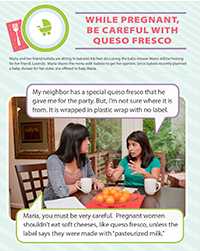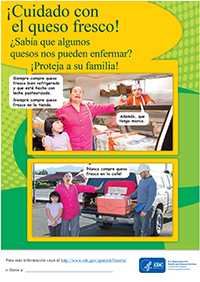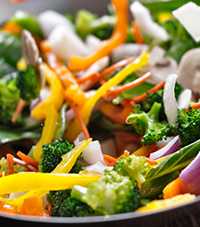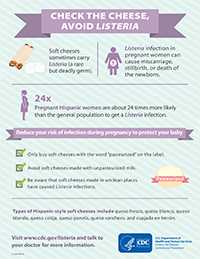People at Risk - Pregnant Women and Newborns
CDC estimates that Listeria is the third leading cause of death from food poisoning in the United States. About 1,600 people get sick from Listeria each year, and about 260 die. Pregnant women and their newborns are much more likely to get a Listeria infection, which is called listeriosis.

-
Pregnant women are 10 times more likely than other people to get Listeria infection.
-
Pregnant Hispanic women are 24 times more likely than other people to get Listeria infection.
-
Pregnant women with a Listeria infection can pass the infection to their unborn babies.
-
Listeria infection can cause miscarriages, stillbirths, and preterm labor.
-
Listeria infection can cause serious illness and even death in newborns.
You Can Help Protect Yourself and Your Baby
See resources for pregnant women (English) >
- Protect your unborn baby or newborn from infections
- Recipe for Food Safety: Protecting people from deadly Listeria food poisoning
- Checklist of foods to avoid during pregnancy
- Tips for preventing a Listeria infection
Ver recursos para las mujeres embarazadas (Español) >
- Listeriosis y el embarazo
- Podcast: Las mujeres embarazadas y el queso fresco y otros tipos de quesos blandos consumidos en la comunidad hispana
- Proteja a su bebé de las infecciones antes y después de nacer
- Signos Vitales: Receta para la seguridad de los alimentos [PDF 1 page]
- ¡Cuidado con ese bocado! Cómo proteger a aquellos en riesgo de intoxicaciones alimentarias por listeria
- Lista de alimentos que se deben evitar durante el embarazo
- Consejos para prevenir una infección por listeria
Haga clic aquí para ver mas recursos educativos en español >
Soft Cheeses and Pregnant Women
Fotonovela
While Pregnant, Be Careful with Queso Fresco

Poster
Beware of Queso Fresco!

8″x11″ [PDF – 1 page]
11″x17″ [PDF – 1 page]
24″ x 36″ [PDF – 1 page]
Food Safety Tips

- Wash your hands the right way – for 20 seconds with soap and running water.
- Use a thermometer to make sure your refrigerator is 40°F or lower and your freezer is 0°F or lower.
- Keep raw meat away from fresh produce and other ready-to-eat food, to avoid contamination.
- Thaw or marinate foods in the refrigerator, never on the counter or in the kitchen sink.
- Wash fruits and vegetables (even if you plan to peel them), but do not wash meat, poultry or eggs!
- Use separate cutting boards for raw produce and for raw meat, poultry, seafood, and eggs.
- Use a food thermometer to be sure food is cooked to its proper temperature.
- Refrigerate leftovers within 2 hours in shallow covered containers and use within 3-4 days.
- Know when to throw food out.
- Page last reviewed: December 12, 2016
- Page last updated: June 29, 2017
- Content source:


 ShareCompartir
ShareCompartir
